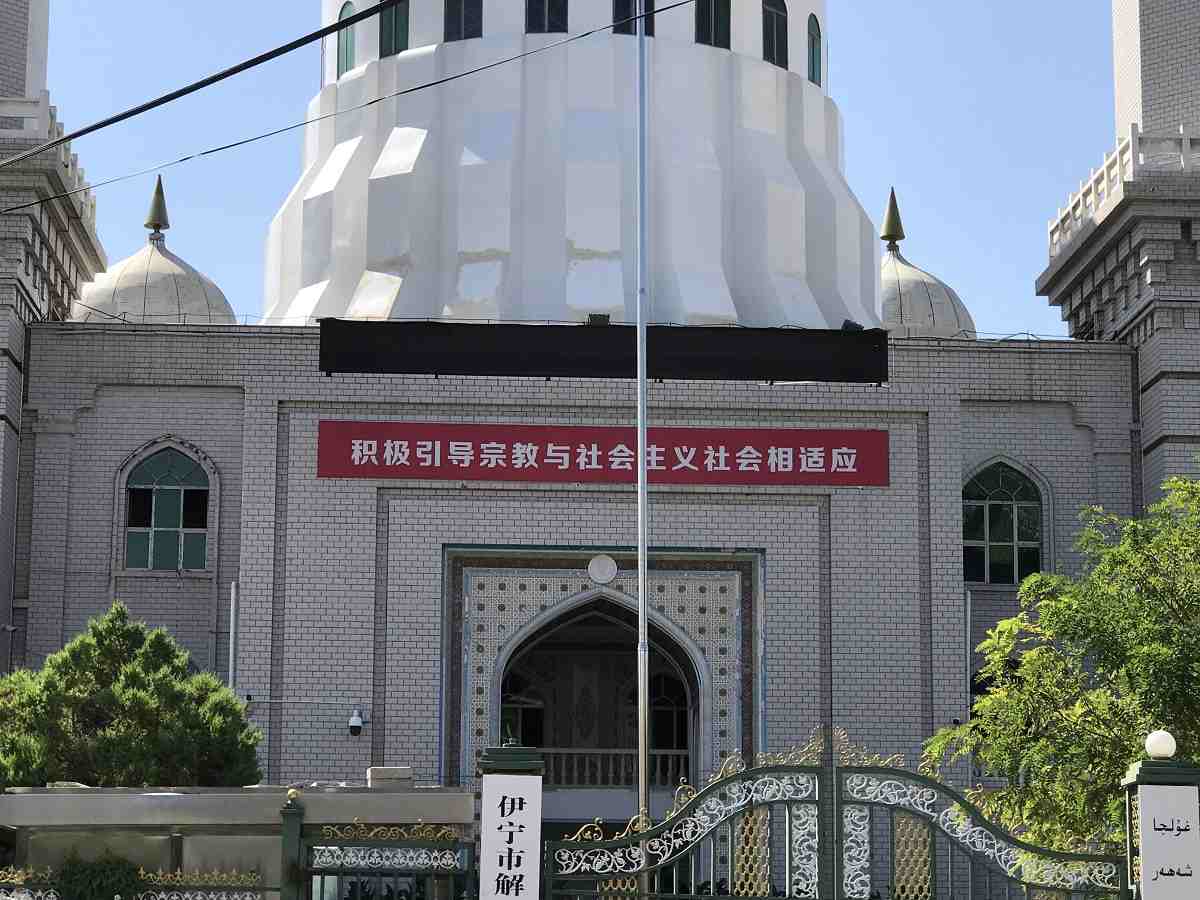
A banner at a mosque in Xinjiang reads, “Actively guide religion to accommodate socialism,” in 2019.
12:14 JST, May 30, 2023
Residents of a majority-Muslim town in southwestern China clashed with police over the weekend as they tried to stop the demolition of a domed roof from a centuries-old mosque, part of the Chinese Communist Party’s expanding effort to control religion.
Dozens of officers in riot gear beat back a crowd as they pushed toward the gate of the Najiaying mosque, an important seat of worship and religious teaching for ethnically Hui Muslims in Yunnan province, on Saturday morning, according to videos sent to overseas activists and posted to Twitter.
Later clips showed that police had retreated from the area while demonstrators staged a sit-in outside the gate that continued through the night. Dozens of camouflaged officers from the armed police arrived on Sunday, according to another video.
The incident appeared to be related to a court judgment from 2020 that ruled some of the mosque’s most recent renovations were illegal, and ordered demolition.
Calls to local phone numbers Monday went directly to messages indicating the lines were busy. Activists speculated that authorities had cut off local cell service.
On Sunday, Tonghai County police labeled the incident “seriously harmful to orderly social management” and urged anyone involved to surrender themselves to law enforcement before June 6 for a chance at a lighter punishment.
With a history that may stretch as far back as the 13th century, the Najiaying mosque was expanded many times over the years to add buildings, as well as four minarets and a domed roof. In 2019, part of the structure was listed as a protected cultural relic.
In recent years, however, Communist Party restrictions on the pious have escalated sharply. The country’s top leader, Xi Jinping, has demanded absolute political loyalty of faith communities and the “sinicization” of religion.
Surveillance of religious leaders has also intensified. A nationwide database of officially approved Islamic, Protestant and Catholic religious teachers was launched this month.
The campaign has focused on Islam and Christianity because of the party’s deep-seated fear of faith being a vector for foreign influence. As well as restricting international exchanges and donations, authorities have remodeled religious buildings whose outward appearance was deemed insufficiently Chinese.
Xinjiang, a northwestern region that was home to millions of Turkic-language-speaking Uyghur Muslims, was hit the hardest. There, the sinicization push was combined with a “deradicalization” program of mass detention and reeducation, which the United Nations ruled last year may amount to crimes against humanity. Estimates of the number of mosques and shrines destroyed in the region reach into the thousands.
Unlike in Xinjiang, the Mandarin Chinese-speaking Hui minority originally avoided similarly severe restrictions. But eventually, the crackdown spread to Islamic communities across the country’s northwest, including to Hui in Qinghai.
Situated in an ethnically diverse and remote region of China, the Hui of Yunnan are among the last to face scrutiny. The region is often held up as an example of an ethnically and religiously diverse place, where residents are adept at navigating various identities and being politically flexible when necessary.
Even government-backed researchers acknowledge that a flexible approach historically allowed Hui in Yunnan to avoid the worst excesses of the Cultural Revolution, when most of China’s mosques, churches and temples were closed.
At the time, the Najiaying mosque hosted readings of Mao Zedong Thought and painted slogans on the walls so that they could meet and continue worshiping, Li Hongchun, a researcher at the Yunnan Academy of Social Sciences, wrote in an article about regional history published in 2010.
“At critical junctures when faced with a political conflict that could slip into violence, the Hui of Najiaying kept quiet and actively engaged with the government to dispel misunderstanding and successfully avoid tragedy,” demonstrating a “unique kind of ethnic survival wisdom,” he said.
But that space for negotiation and a nonviolent outcome appears to be shrinking.
On Monday, as news of the unrest spread, nationalist commentators urged a forceful response. On microblog Weibo, Xi Wuyi, an influential Marxist scholar at the Chinese Academy of Social Sciences known for her hard-line stance against religious expression, called for “zero tolerance” to what she labeled criminal activities.
Top Articles in News Services
-

Survey Shows False Election Info Perceived as True
-

Hong Kong Ex-Publisher Jimmy Lai’s Sentence Raises International Outcry as China Defends It
-

Japan’s Nikkei Stock Average Touches 58,000 as Yen, Jgbs Rally on Election Fallout (UPDATE 1)
-

Japan’s Nikkei Stock Average Falls as US-Iran Tensions Unsettle Investors (UPDATE 1)
-

Trump Names Former Federal Reserve Governor Warsh as the Next Fed Chair, Replacing Powell
JN ACCESS RANKING
-

Producer Behind Pop Group XG Arrested for Cocaine Possession
-

Japan PM Takaichi’s Cabinet Resigns en Masse
-

Man Infected with Measles Reportedly Dined at Restaurant in Tokyo Station
-

Israeli Ambassador to Japan Speaks about Japan’s Role in the Reconstruction of Gaza
-

Videos Plagiarized, Reposted with False Subtitles Claiming ‘Ryukyu Belongs to China’; Anti-China False Information Also Posted in Japan
























